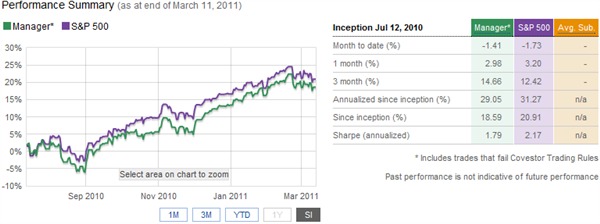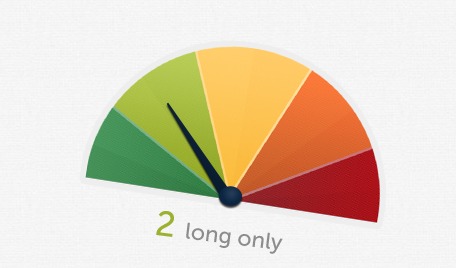I like to invest in companies that are financially healthy, with a solid line of products, a reasonable market share, strong growth potential, and that are valued at a reasonable price. It is not easy to find companies that meet all of these requirements, but when I find one I usually allocate a good portion of my portfolio to it – generally around 10%. The latest company to catch my attention in this way is Oracle (ORCL).
Oracle is one of the world’s largest providers of enterprise software and a leading provider of computer hardware products and services. Oracle is also one of the big players in the cloud computing revolution, and even more importantly, it is one of the pioneers.
For many years, Oracle has provided cloud computing services, including clustering, server virtualization, Service-Oriented Architecture (SOA), shared services, large-scale management automation, and more recently, engineered systems.
Oracle Cloud includes software application services, such as Oracle Fusion Human Capital Management (HCM) Cloud Service and Oracle Fusion Customer Relationship Management (CRM) Cloud Service, and software platform services such as Oracle Database Cloud Service and Oracle Java Cloud Service, among others. Oracle seeks to be an industry leader in each of the product categories in which they compete, and to expand into new and emerging markets.
I’m investing in the cloud computing model for three main reasons:
-
In my opinion, cloud computing has the potential to end piracy. Once all software platforms live on a cloud, people won’t be able to just burn a DVD with the software and pass it around.
-
Cloud computing will create stronger ties between clients and providers. Once you operate your company using the infrastructure of a specific vendor, it will be very difficult to move away from that infrastructure.
-
Updates will be more frequent and mandatory. People won’t be able to skip releases anymore. A lot of people currently still using Windows XP, for example, are skipping several releases of Microsoft Windows. Under the cloud model, new releases could be part of the deal, and adoption will be higher.
Though the explosion of cloud service applications may be recent, cloud computing itself it is not a new field. If you think about it, email clients such as Hotmail, AOL, and Yahoo Mail are all cloud services, applications that store data and are accessed via a web browser, and all of them were created about 15 years ago.
As cloud computing becomes the new “trendy industry,” I believe people are making irrational decisions on some companies within this market. For example, the P/E ratio of VMare (VMW) was over 60 just one year ago and today it is around 45. This is a fairly high valuation for a company that doesn’t pay dividends, and for a stock down sharply year-to-date. I always prefer to look for value stocks, and if I can’t find them, I simply add the stocks to my watch list and wait for the right moment.
So if you are also considering the cloud computing model, there is no need to go crazy. Microsoft (MSFT), a position that I added to my portfolio a couple of months ago might be one of the largest beneficiaries of the implementation of this technology worldwide. The same is true of Oracle (ORCL), Dell (DELL), or possibly even Adobe (ADBE).
The reason I like Oracle is not only because is one of the leaders and pioneers in this industry, but also because at the current valuation it is very attractive.
Oracle’s P/E ratio is only around 15, as compared with its average of 30 over the last 10 years. The P/E ratio of Oracle is close to its lowest level in 10 years.
Although EPS increased nearly 400% in 10 years, the price of the stock has increased by only around 170%. History has taught us that prices generally follow earnings.
Oracle is also generating great value for its customers. The company recently acquired cloud-based software providers such as RightNow and Taleo, which I believe should help it to gain market share in the enterprise cloud software market.
“Oracle is moving aggressively to offer customers a full range of Cloud Solutions including sales force automation, human resources, talent management, social networking, databases, and Java as part of the Oracle Public Cloud,” said Thomas Kurian, Executive Vice President, Oracle Development, when RightNow was acquired in October 2011.
Oracle’s Chief Executive Officer, Larry Ellison, has snapped up more than 70 companies in a $40 billion buying spree to add programs that help large corporations manage human resources and operations. Of note, the acquisition of Taleo in 2012 was cheaper than what SAP paid for competitor SuccessFactors.
This acquisition gave Taleo an enterprise value of 4.7 times its estimated sales that year, according to data compiled by Bloomberg. SAP paid 7.4 times SuccessFactors’ estimated sales. Ellison’s approach is to never overpay for deals, and as an investor, I appreciate that.
Another thing that I like about Oracle is that they are repurchasing stock like never before. For me, this is the best indicator of a company’s financial strength and commitment to the future. On December 20, 2011, Oracle’s board of directors approved repurchase of shares of common stock for $5 billion, and on June 18, 2012, it was expanded by an additional $10 billion. 2012 set an all-time record of repurchase shares from the company totaling $9.07 billion. So far in 2013 the company has already repurchased $1.58 billion. I expect repurchases to continue in 2013. At the same time its dividend yield is an all-time high, which makes the stock purchase even more attractive.
One final thing that I love about Oracle is that free cash flow has grown notably, especially over the last couple of years. The current ratio is also at all-time high, which means the company is more likely than ever before to pay its short term obligations by using its short term assets (cash, inventory, receivables).
Forget about new fancy cloud computing stocks that over promise and under deliver. If you really want to take advantage of this new technological development, I believe Oracle is one of the strongest candidates out there.
The investments discussed are held in client accounts as of April 30 , 2013. These investments may or may not be currently held in client accounts. The reader should not assume that any investments identified were or will be profitable or that any investment recommendations or investment decisions we make in the future will be profitable.




